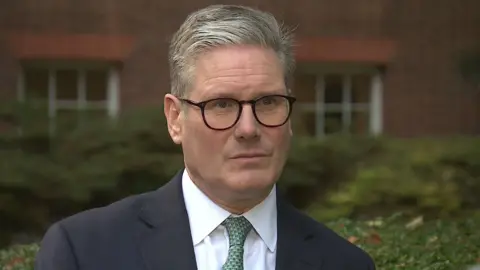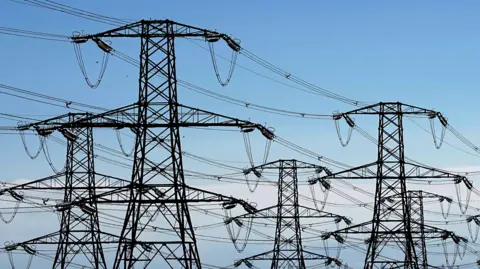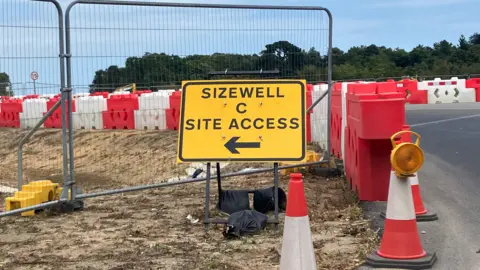Pylons and solar farms the cost of lower bills
September 19, 2024
 BBC
BBCThe prime minister has defended plans to build pylons, electricity substations and solar farms across the East of England.
In his first interview on the subject since winning July’s election, Sir Keir Starmer described them as a necessary trade-off for reducing energy bills.
He told the BBC he was listening to people worried about the impact on the countryside but added: “I am also listening to the very many people who told me that the energy bills they’ve faced in recent years have been absolutely impossible to deal with.”
Sir Keir said he was still committed to the building of Sizewell C nuclear power station in Suffolk, insisting that private investors were ready to help.
 Gareth Fuller/PA
Gareth Fuller/PA‘Tough decisions’
Speaking in the garden of 10 Downing Street, Sir Keir said he understood the concerns, but that his priority was delivering lower energy bills.
“Any business or family will remember that prices went through the roof and we’ve got to find a way to stabilise that and bring those bills down,” he said.
The solution, he explained, was transitioning to renewable energy.
“The trade-off is that you have to have the infrastructure. We won’t be able to deliver lower energy bills if we don’t do the infrastructure as well,” he said.
This week Energy Secretary Ed Miliband called people who opposed energy infrastructure “blockers, delayers and obstructionists”.
Asked if his message to the region was “You’ve just got to accept this,” Sir Keir said: “We do have to take tough decisions.
“If they had been taken 10 years ago, we would never have had energy bills go through the roof.”
But he wants communities to be rewarded for accepting energy infrastructure, possibly through discounted electricity bills.
“We want to do deals with local people so they can see a benefit for their community and that’s part and parcel of what we’re rolling out,” he said.
 Guy Campbell/BBC
Guy Campbell/BBCAs well as wind and solar, plans for another nuclear power station at Sizewell C are well advanced.
Sir Keir said nuclear was part of the future and he was determined to get the necessary investment into the project.
Some of the initial investment is coming from the government, but opponents have questioned if there will be enough private investors willing to put money into such an expensive scheme.
The Prime Minister insisted there would be be.
“When you talk to investors, whether it’s in nuclear or anything else, they say the conditions for investment are stability, certainty and strategic thinking from the government,” Sir Keir said.
“They’re looking at this government with a clear mandate for change and they are seeing the certainty and stability of long-term plans.”
A spokesperson for National Grid said the proposed Norwich to Tilbury power lines were needed urgently to connect offshore wind farms by 2030 to deliver energy security and connect homes and businesses to greener and more affordable energy sources.
“We understand people have concerns about the impact of new overhead lines and we are very grateful to everyone who has shared their views with us over the past two years as we have been developing our plans for new infrastructure,” they said.
The spokesperson said feedback from local communities and stakeholders would be carefully considered as National Grid finalised its plans and prepared its planning application, expected to be submitted in 2025 ahead of a final decision by the energy secretary.
‘I want to see it through’
The other big issue for our region is the hospital rebuilding scheme, set up by the last government but currently on hold while the new one works out whether it will be affordable.
Among those desperate for a decision are the Queen Elizabeth in King’s Lynn, Norfolk, the West Suffolk in Bury St Edmunds and Hinchingbrooke in Huntingdon, Cambridgeshire, which have Reinforced Autoclaved Aerated Concrete (Raac), which is prone to crumbling.
“Those with Raac have to be a priority and I’m very happy to confirm that to you,” Sir Keir said.
So when will work start?
“As soon as we have gone through the review and we are able to set out the timetables. When I make a commitment I want to see it through,” he said.
The prime minister is keen to come across as a man who is determined to get things done – but also to keep his word.
Search
RECENT PRESS RELEASES
Related Post




